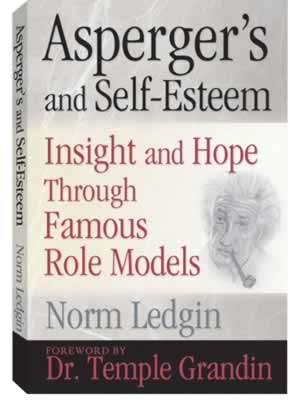
Asperger’s and Self-Esteem: Insight and Hope
From composer Amadeus Mozart to astronomer Carl Sagan, Ledgin examines the evidence of Asperger’s Syndrome in some of history’s most famous men and women and shows how, despite their apparent challenges, each made an immeasurable contribution to the world. A great book to raise the self esteem of those with Asperger’s.
Reviewed by Maureen Bennie
Director, Autism Awareness Centre Inc.
Norm Ledgin successfully puts to rest the negative connotations an Asperger’s diagnosis usually has. He’s devoted his literary energy into seeing the positive aspects of Asperger’s Syndrome. Society generally looks upon people with different or unusual traits as abnormal, but Ledgin sees the Asperger’s traits as great gifts. He uses famous role models to emphasize the point of what these unusual traits have contributed to society and have made us richer for it.
The book opens with a forward by Dr. Temple Grandin, a woman who defied the odds that her autism diagnosis would not allow her to succeed. She is one of the most famous people with autism. Grandin gives us a glimpse into the world of a person with Asperger’s Syndrome and recognizes the talent each individual has.
Norm Ledgin uses the first 5 chapters to give the reader a behind the scenes look at Asperger’s Syndrome. He gives us a brief look at the criteria used to diagnosis the syndrome derived from the DSM IV (pg. 37).
The next 13 chapters describe famous people who are believed to have had Asperger’s. He discusses such greats as Albert Einstein, Charles Darwin, Orson Welles, Marie Curie, Carl Sagan, Glenn Gould, Mozart, and Thomas Jefferson. Each role model is given their own short chapter complete with a beautiful illustration drawn by Ledgin’s wife Marsha. Mr. Ledgin explores each famous person’s traits and their significant contributions that made them famous. He includes quotes from other sources to back up his research.
Ledgin wraps up the information about these 13 famous people by devoting a chapter to the parallels they shared such as musicianship or childish behavior. He wrote 4 chapters for parents to dispel their worries and change their negative thoughts about Asperger’s to positive ones. He emphasizes the need for parents to be role models and accept their children for who they are. Ledgin has first hand experience because his son has Asperger’s.
The book ends with a poignant appendix listing all of the positive traits of Asperger’s. Ledgin’s overall view of the disorder is it’s all in how you look at it. You can dwell on the negatives or celebrate the positives.
This book is an easy read – a plus for parents and extended family members of someone with Asperger’s. Parents can also use the role models mentioned to assure their child that there were others like him that lead amazing, productive lives. After reading this book, parents will say to themselves, “Wow – my child has Asperger’s Syndrome. I wonder what they’ll contribute to our world?”
$27.95
In stock
